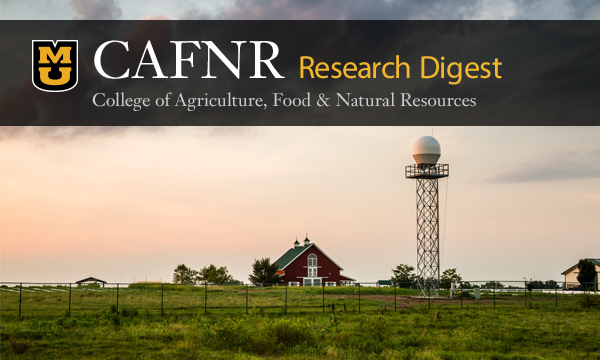|
CAFNR faculty members have received the following recent grants (listed by Principal Investigator):
Sybill K. Amelon, Integrating Bat Physiological Responses and Population Status into Assessments of Forest Management Activities and Landscape, 5/1/2018 – 6/30/2020, $150,705, Missouri Department of Conservation
Kerry Clark, BFP19Baah (Liberia) AgStrategicComm@Missouri, 8/1/2019 – 7/31/2021, $47,292, Foreign Agricultural Service
James T. English, Acquisition of Good and Services – PGRUFY19-20, 4/1/2019 – 3/31/2020, $15,076, Agricultural Research Service
Benjamin O. Knapp, Evaluating Effects of Method and Timing of Release on Shortleaf Pine Regeneration in the Missouri Ozarks, 6/20/2017 – 3/1/2022, $9,314, Forest Service
Patrick S. Market, A Case Study of the Midwest Elevated Convective Wind Event of 13 April 2018, 8/1/2019 – 6/30/2020, $14,170, University Corporation for Atmospheric Research
Azlin Mustapha, BFP19 Tanzania (Mwanyika) FS@Missouri, 8/1/2019 – 7/31/2021, $49,535, Foreign Agricultural Service
Craig Paukert, Potential for Conservation Lands in Middle Mississippi River Floodplains to Mitigate Flood Flows for Ecosystem Services, 8/10/2017 – 9/30/2020, $54,528, US Geological Survey
Randall S. Prather, Immunodeficient FAH -/- Pigs, 6/1/2019 – 5/31/2020, $45,431, Mayo Clinic
Randall S. Prather, National Swine Resource and Research Center 1, 8/1/2019 – 7/31/2020, $1,445,966, NIH Office of the Director
Robert Michael Roberts, Pluripotent Human Stem Cells as Models for Normal and Abnormal Trophoblast at Implantation, 9/25/2018 – 6/30/2020, $450,099, NIH National Institute of Child Health and Human Development
Kenneth Schneeberger, BFP19 Malawi (Mapulanga) AgStratComm@UMO, 8/1/2019 – 7/31/2021, $49,888, Foreign Agricultural Service
Kenneth Schneeberger, CFPFY19 Brazil Biofuel Policy@MU, 8/12/2019 – 2/14/2020, $75,576, Foreign Agriculture Service
Jinglu Tan, Acquisition of Goods and Services – CSWQ FY20, $22,000, Agricultural Research Service
Shuqun Zhang, A Plant MAPK Cascade in Effector-Triggered Immunity: Role of Chloroplast-Originated Reactive Oxygen Species, 8/1/2019 – 7/31/2020, $340,000, NSF Division of Integrative Organismal Systems
Zhanyuan Zhang, Transforming Cereal Genomics: Tooling Up for Empowered Phenotyping Platforms, 8/1/2018 – 7/31/2020, $10,000, University of Rhode Island
Provided by the MU Office of Research
|
